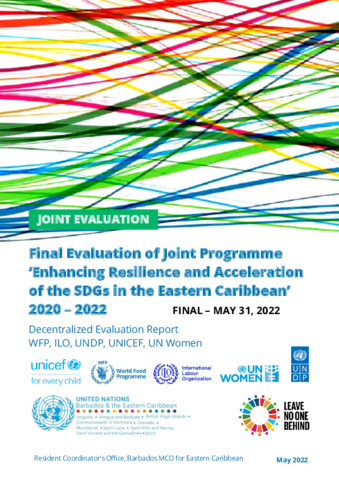
The evaluation was summative in nature and covered all activities under the Joint Programme for enhancing resilience and acceleration of the Sustainable Development Goals in the Eastern Caribbean. The Joint Programme sought to develop adaptive and universal social protection systems in Barbados, Saint Lucia, and other countries in the Eastern Caribbean (through the Organization of Eastern Caribbean Stated) between January 2020 through mid-March 2022 under the JP.
The evaluation objectives were accountability and learning, for which the external evaluation team proposed mixed-method, theory-based, and utilization-focused approach. The data collection methods used included key informant interviews (17 women and 10 men), and 10 beneficiary households (6 women and 4 men); desk review of key project documents and related studies; a case study on ‘Jointness’ was produced; and the team also conducted a stakeholder debriefing during which polling exercises were conducted to gain additional insights on preliminary findings.
Findings and conclusions were developed based on evidence gathered and triangulated by the evaluation team. This analysis corresponds to the six main questions presented below that were structured around the evaluation criteria of relevance, coherence, effectiveness, efficiency, sustainability, and gender, equity and inclusion.
1. To what extent are the JP design and implementation relevant and coherent?
2. What are the results of the JP?
3. How efficient was the partnership of the PUNOs and partners in implementing the JP and leveraging further resources?
4. Is there evidence that in the long-term the JP is likely to contribute to changes in vulnerability?
5. To what extent are the benefits of the JP sustainable?
6. To what extent did the JP consider and contribute to gender equality, equity, and social inclusion?
Key conclusions of the evaluation were:
- The programme coherently responded to beneficiary needs which were evident in past assessments and mapping exercises; the short time frame allocated to project design and implementation limited stakeholder engagement primarily to remote modes. The JP proved highly relevant within the Eastern Caribbean context, and even more in the context of the COVID-19 pandemic. The coherence with other interventions of International Financial Institutions (IFIs) in the field of social protection was high.
- Overall, there has been considerable progress towards the expected outputs and outcomes of the programme which was facilitated by developing partnerships and collaborations beyond the partnering UN organisations and Resident Coordinator’s office, as well as by government’s demand for strengthening social protection systems. There was evidence of the benefits of jointness and adaptability of the joint programme to respond to dynamic situations through leveraging comparative advantages and linking with development partners – the programme linked expertise and evidence to drive results.
- The programme is complex and multi-dimensional; there was evidence of efficiency resulting from the well-coordinated and adaptive collaboration between the partners – and this could be further enhanced by planned opportunities to review and adjust programming at the mid-term.
- The joint programme provided an important platform for the formulation of effective and creative social protection strategies that respond to immediate and long-term needs of beneficiaries in the future.
- The sustainability of the programme’s benefits is evident on multiple levels including coordination structures, evidence development, and permanent expansion of social protection coverage through triggering conditional disbursements under concessional loan financing from IFIs.
- The programme considered and contributed to gender equality, equity, social inclusion and inclusion of persons with disabilities in numerous ways – by utilizing evidence of vulnerable people’s views in the design process, at the systemic level through facilitating modelling and effective scale up and adaptation of existing social protection programmes, and facilitating the process of the respective beneficiary Governments in systematically considering social protection options to maximize beneficiary resilience and ensure gender sensitivity.
Key evaluation recommendations are:
1. Advocate for reviewing the timeframes for JP design and implementation.
2. Develop a rubric of criteria to be used in validating the selection of PUNOs in future JPs to ensure coherent rationale for collaboration based on comparative advantages and mandates of each agency - with consideration of joint programming transaction costs.
3. Systematically include mid-term reviews to enhance flexibility in future JPs and create space for reflection and revision of activities, budget, indicator targets, lesson-learning, etc.
4. Where JPs work with governments to expand or pilot new ways of providing social protection support, advocate with Government counterparts to ensure that a strategy is in place to communicate the purpose and scope of pilot interventions with beneficiaries.
5. The PUNOs and RCO should advocate with the governments of Barbados and Saint Lucia to sustain the Country Coordinating Committees that were established for this JP.
6. Future efforts of PUNOs which scale-up/replicate this JP should replicate its systematic consideration of gender equality, equity, and social inclusion in their design and strategies.
